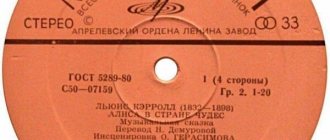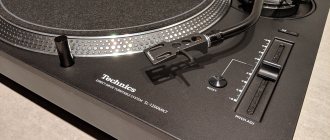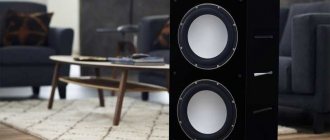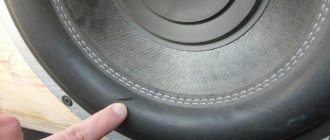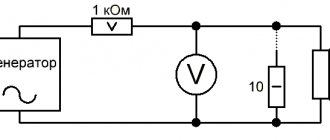The classic material for making records is polyvinyl chloride, from which the familiar, popular “vinyl” originated. It has its own shortcomings, due to which records require quite careful treatment. Let's consider all the precautions that it is advisable to observe when working with your favorite records and learn how to store and wash vinyl records at home.
The material of the plates has a fairly low melting point (60-700C), is easily deformed under mechanical load even under normal temperature conditions, and is quite soft. Because of this, scratches and cuts easily appear on the records if they are not used carefully. In addition, polyvinyl chloride is easily electrified, making it an excellent dust attractor.
Being an amorphous substance, like any plastic, polyvinyl chloride crystallizes very slowly. Because of this, it becomes less ductile and more fragile. This applies to a greater extent to old records, so the ability to properly store and wash vinyl records is even more important for them.
How to store vinyl records
- Do not touch the surface of the record with your fingers. Hold the record with both hands only, touching only the outer edge and the center circle with the label. Sweat and oil from your hands collect dust.
- Avoid repeating from the middle of the record. Any lowering of the needle, even with the help of a microlift, creates scratches and subsequently leads to microcracks on the surface of the record.
- Be careful. Touching with long nails, metal jewelry and other hard objects causes scratches, which increase noise.
- Do not stack multiple records on top of each other when removing them from the sleeve.
Separate rack or special storage cabinet
This is the best option for storing vinyl records. Their standard height together with the envelope is 32 centimeters. Therefore, you need to take into account that there should be a distance of 33-34 cm between the shelves so that you can safely place records on the floor and take them out from there.
If the records are pressed tightly against each other, this will have a bad effect on their safety. Don't waste space and try to squeeze another copy onto the shelf when you've already run out of space. This method can simply damage the vinyl.
If the collection is small, you can use special book dividers or take up the remaining space on the shelves with tomes.
Vinyl records and dust
- Don't leave records without a sleeve. Every hour about 5 g of dust falls into the room. Dust has a strong abrasive effect (mechanical friction) as the needle passes through the groove. This leads to abrasion of the groove walls.
- Clean the surfaces of vinyl records from dust before and after playing. To do this, use dry soft tampons or tampons specially designed for this purpose. Microfiber cloths work great. Use materials that do not leave lint. Wipe lightly, without strong pressure, using circular movements in the direction of the grooves.
- Avoid using “antistatic” liquid to remove dust. Such liquid can often do more harm than good.
- Don't blow away the dust. This moistens the surface, which promotes the settling and adhesion of dust.
- Avoid smoking in the room while listening to or recording particularly valuable records. Tar and nicotine particles and cigarette ash are so fine and small that they are difficult to clean from records and are also highly abrasive.
Outer envelope
He must BE. Its absence guarantees very rapid abrasion of the album cover, the appearance of a “ring” and other troubles. In principle, any type of sleeve will effectively protect the record cover, but there are nuances.
NOT RECOMMENDED for storing the collection:
Thin, resealable outer envelopes with a “flap.”
This is more of an option for packaging records for sending by mail. Firstly, they are very thin and will not completely protect adjacent covers from rubbing against each other. Secondly, the taped “flaps” (folds) will cling to each other on the shelf and begin to look untidy. Thirdly, there is a chance that the album cover will touch the sticky layer on the envelope, and then you are guaranteed to tear the surface of the cover (because the glue is “long-lasting”). Fourthly, the most important thing: these envelopes eliminate (or minimize) microcirculation of air inside the envelope, and this is the most important thing! We will explain why below.
Thick envelopes with stitching along the edges.
These envelopes are made from PVC, and not the most stable grade of this material. If you place an album in its original film (shrink) in such an envelope, very often after a year you discover that the entire envelope has “waves” or, what is even more unpleasant, bubbles. It turns out, well, very ugly. In general, modern PVC envelopes often “out of the blue” “go in waves” over time. The most important thing is that in such envelopes you should never place the disc close to the envelope (and not inside the cover). This is fraught with total damage to the disk literally in a matter of months (sometimes in years), more details below.
Other types of outer envelopes - polyethylene or cellophane of different thicknesses - are quite suitable for storing a collection.
Washing vinyl records
If there are stains on the record, then to remove them it is better to use a detergent like Fairy (preferably without any vitamin E for hands). This process, although it looks barbaric, is very effective and at the same time safely cleans the records from dirt.
- Rinse the plate with slightly warm ( but not hot! ) water over the entire surface except the label.
- Pour the detergent onto the surface of the vinyl and gently spread it over the entire surface of the record using your fingertips.
- Using a soaked piece of cotton wool or microfiber, move along the paths without much pressure. It is not advisable to make movements across the grooves.
- After the entire plate has been passed through on both sides, rinse it thoroughly under high pressure water and then place it on a clean cloth or paper towel to dry.
Be careful not to let water get on the center label of the record. For most records, especially Soviet ones, this can lead to streaks.
Do you know what the inscriptions on a record label mean and how to determine the year it was recorded? — Record number and other information on its label
Rent a box at a specialized warehouse
One of the best options for storing records is to keep them in special boxes. Clients can rent them from Homewarehouse. conditions for careful storage have been created here.
, the records are safe:
- The premises are maintained at constant humidity and temperature. Specialists know what storage conditions are necessary for each item and can set the necessary parameters.
- Rent a warehouse
It can even be used to store collections of valuable records. It is under 24-hour security and has video surveillance throughout the entire territory.
- The warehouse is located near public transport stops and busy highways, which eliminates any problems with logistics.
If the owner cares about his records, he will do everything necessary to carefully store them. Work is carried out with legal entities and individuals, an official contract is concluded.
Pickup stylus
And of course, don’t forget to regularly clean the pickup stylus from dust and lint! It should be cleaned very carefully and carefully, with a small soft brush (preferably a squirrel brush). The movements of the brush should be directed along the tonearm, and not across.
Choosing a storage location for your recording collection
The environment in which your recordings are stored has a major impact on the longevity of the recording and its enclosure. High humidity and temperature fluctuations can cause mold growth and accelerate deterioration, sunlight will discolor folders, and extreme heat can warp vinyl, so careful consideration should be given to where you store it.
Basic recommendations:
- Don't store records near a radiator or window; there are several reasons to avoid these places. High temperatures over time can cause recording distortion. The UV radiation present in sunlight will discolor and destroy the folder. Windows and radiators can also be sources of water leaks, which can easily ruin your collection.
- Keep away from cold outside walls. Cold exterior walls are a haven for mold. Condensation, minimal light, minimal airflow, mold growth - can encourage pests. Mold and insects will ruin your records and grooves.
- Garages, sheds and attics are not suitable spaces. These rooms have large fluctuations in temperature and humidity, which will cause the record to distort as they swell and shrink. Stable cool temperature and humidity are essential.
- Make sure they will not be subject to accidental vibration, such as from a washing machine.
- You need to find a cool, dry place away from potential leaks. The ideal RH (relative humidity) is around 35-40%. This can also be controlled using Prosorb cassettes which absorb and desorb moisture to maintain the required humidity.
Preface
Many people who start getting into vinyl don’t think about the fact that a record is quite delicate and requires special care. This is logical, because today, when most people listen to music on digital media, the issue of care does not arise at all. However, how you care for and protect your vinyl disc will determine its lifespan and sound quality. To be honest, at the beginning I also didn’t think about cleaning the records in any way: buying a special brush, solutions, brushes for the needle, etc. – the price tags in stores for these accessories were intimidating and it seemed that this was not so important. But in fact, records are subject to constant wear and tear during use - dust or even dirt constantly sticks to it from static electricity, grease stains remain from the fingers (for those who pick up the record by the tracks) and much more. All this contributes to the rapid loss of the plate’s original properties.
I will try to introduce you to the primary care options. There won't be any super life hacks from experts who infuse records in special solutions or buy special cleaning machines. Advice is only for ordinary or novice listeners, and not audiophiles (the latter already know everything better than anyone else).
Experiments
I didn’t immediately pour the solution, but first did a couple of simple experiments - anyone can repeat them at home without negative consequences. The first tablet I came across was a tablet with fingerprints on the screen - how could it be otherwise? I tried wiping the screen with a regular napkin moistened with Analog Renaissance Record Cleaning Liquid. Removed all traces unexpectedly quickly and easily. This action usually requires more effort.
Marks left on glass after liquids dry. On the left is Analog Renaissance Record Cleaning Liquid, in the middle is distilled water (apparently, not the best quality, so you shouldn’t always trust what is sold in auto stores), on the right is regular tap water
I conducted the next test, again, on the screen of an experimental tablet. I wetted three napkins: one with tap water, the second with distilled water, and the third with washing liquid. I put a few blots on the glass and left it to dry. Ordinary water left noticeable marks that cannot be erased with one swipe of a napkin. I had different distilled water, both laboratory and from a car dealership. The latter turned out to be not of very high quality, and the marks were noticeable. It is also useful to take note of this possible difference. The record cleaning solution did not leave any noticeable marks. This is a good result, which means the solution cleans without leaving a trace.
For staunch supporters of alcohol liquids with added detergent components, I conducted another test. I mixed 2 ml of washing liquid and 2 ml of isopropyl alcohol, and did the same with the concentrate. In both cases, there were no flakes or sediment even after three days of “infusion.” Looking ahead, I’ll say that adding liquids from Analog Renaissance is certainly better than dishwashing detergent or baby shampoo (such advice can be found on forums), they are clearly less washed off and leave a persistent chemical smell.


